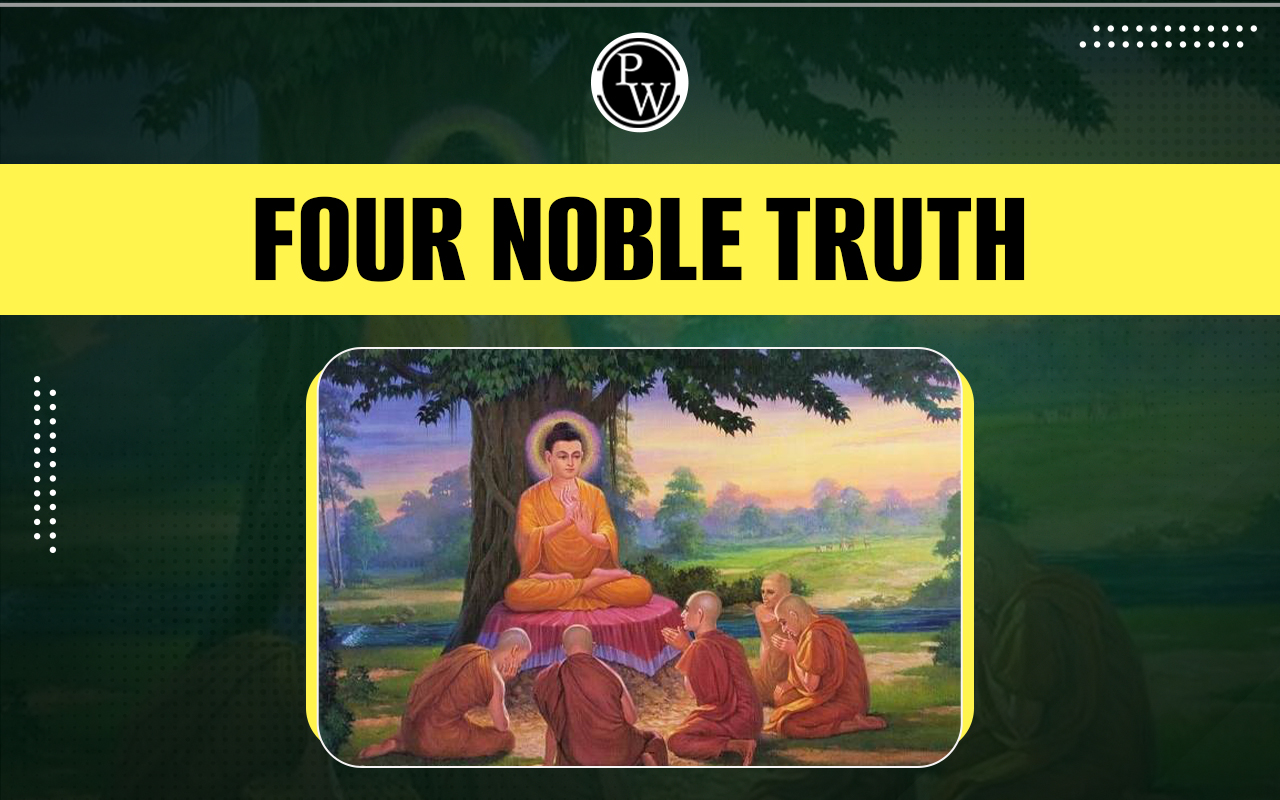
Four Noble Truths: The Four Noble Truths are the foundation of Buddhist teachings, representing the essence of the Buddha's enlightenment and his profound understanding of the nature of human existence. These truths form the cornerstone of Buddhism and are fundamental to understanding the path to spiritual liberation. The Four Noble Truths address the nature of suffering, its origin, its cessation, and the path leading to its cessation, providing a comprehensive framework for understanding and overcoming human suffering.
Buddhism, a major global religion with a rich history and profound system of beliefs, was founded by Siddhartha Gautama, known as the Buddha, who lived from approximately 566 to 480 B.C. Siddhartha Gautama, the founder of Buddhism, was born into an Indian warrior-king's family and lived a life of luxury in his early years. However, upon encountering an old man, a sick man, a corpse, and an ascetic, he realised that suffering is an inevitable part of existence. This realization led him to renounce his royal privileges and seek enlightenment as a monk.The First Noble Truth: Dukkha (Suffering)
The First Noble Truth, known as "Dukkha," acknowledges the existence of suffering in human life. The term "Dukkha" is often translated as "suffering," but its meaning encompasses a broader range of experiences, including unsatisfactoriness, dissatisfaction, and the inherent imperfection of life. The Buddha's recognition of Dukkha was based on his own experiences and observations of the human condition.Types of Suffering
The First Noble Truth identifies three primary types of suffering:- Ordinary Suffering (Dukkha-dukkha): This includes the physical and mental pain experienced in everyday life, such as illness, aging, and death. It also encompasses emotional suffering, including sadness, fear, and frustration.
- Suffering Due to Change (Viparinama-dukkha): This type of suffering arises from the impermanent nature of all things. Even pleasurable experiences are subject to change and ultimately lead to dissatisfaction when they end.
- Suffering Due to Conditioned States (Sankhara-dukkha): This form of suffering is more subtle and relates to the existential discomfort arising from the conditioned nature of existence. It includes the suffering inherent in the very process of living and the constant flux of thoughts, emotions, and experiences.
The Second Noble Truth: Samudaya (The Origin of Suffering)
The Second Noble Truth, "Samudaya," identifies the origin of suffering. According to the Buddha, the primary cause of suffering is "Tanha," often translated as craving, desire, or attachment. Tanha is a deep-seated force that drives individuals to seek pleasure, avoid pain, and cling to transient experiences, leading to a cycle of suffering.The Nature of Craving
Craving manifests in three primary forms:- Craving for Sensual Pleasures (Kama-tanha): This includes the desire for physical and sensory experiences, such as food, sex, and material possessions.
- Craving for Existence (Bhava-tanha): This is the desire for continued existence, including ambitions, aspirations, and the quest for identity and self-importance.
- Craving for Non-Existence (Vibhava-tanha): This involves the desire to escape from unpleasant experiences or the wish for self-annihilation.
The Role of Ignorance
Ignorance (Avijja) plays a crucial role in perpetuating craving and suffering. It is the fundamental misunderstanding of the true nature of reality, including the impermanent and interdependent nature of all things. Ignorance leads to misconceptions about the self, others, and the world, fueling desires and attachments that result in suffering.The Third Noble Truth: Nirodha (The Cessation of Suffering)
The Third Noble Truth, "Nirodha," offers hope and optimism by proclaiming that the cessation of suffering is possible. This state of cessation is known as "Nirvana" or "Nibbana," representing the ultimate goal of Buddhist practice. The Nature of Nirvana: Nirvana is often described as the extinguishing of the fires of craving, aversion, and ignorance. It is a state of profound peace, liberation, and freedom from the cycle of birth, death, and rebirth (Samsara). Nirvana is not a place but a state of being, characterized by the absence of suffering and the presence of ultimate truth and wisdom. Attaining Nirvana: The cessation of suffering is achieved through the elimination of craving and ignorance. This requires a deep transformation of the mind and the cultivation of wisdom, ethical conduct, and mental discipline. The realization of Nirvana is considered the highest attainment in Buddhism and represents the end of all forms of suffering.The Fourth Noble Truth: Magga (The Path to the Cessation of Suffering)
The Fourth Noble Truth, "Magga," outlines the path leading to the cessation of suffering. This path is known as the Noble Eightfold Path and serves as a practical guide for ethical and mental development. The Noble Eightfold Path is often divided into three main categories: wisdom, ethical conduct, and mental discipline.The Noble Eightfold Path
- Right View (Samma-ditthi): Understanding the Four Noble Truths and the nature of reality, including the impermanence of all things and the law of karma (the principle of cause and effect).
- Right Intention (Samma-sankappa): Cultivating intentions of renunciation, goodwill, and harmlessness. This involves letting go of desires, developing compassion, and avoiding harmful thoughts and actions.
- Right Speech (Samma-vaca): Practicing ethical communication, including refraining from lying, divisive speech, harsh language, and idle chatter. Right speech promotes truthfulness, harmony, and kindness in interactions with others.
- Right Action (Samma-kammanta): Engaging in ethical conduct, including refraining from killing, stealing, and sexual misconduct. Right action involves living a life of integrity and non-harm.
- Right Livelihood (Samma-ajiva): Choosing a livelihood that is ethical and does not cause harm to others. This includes avoiding occupations that involve exploitation, deceit, or violence.
- Right Effort (Samma-vayama): Making a diligent effort to cultivate wholesome states of mind and abandon unwholesome ones. This involves developing positive qualities such as mindfulness, concentration, and compassion.
- Right Mindfulness (Samma-sati): Cultivating awareness and attention to the present moment, including mindfulness of the body, feelings, mind, and phenomena. Right mindfulness helps individuals develop clarity and insight into the nature of reality.
- Right Concentration (Samma-samadhi): Developing deep concentration and mental focus through meditation. Right concentration leads to profound states of meditative absorption (jhanas) and ultimately to the realization of Nirvana.
Practical Application of the Four Noble Truths
The Four Noble Truths are not merely abstract concepts but practical teachings that can be applied to everyday life. By understanding and integrating these truths, individuals can transform their lives and move towards greater peace and fulfillment.Mindfulness and Meditation
Mindfulness and meditation are essential practices for applying the Four Noble Truths. Mindfulness involves paying attention to the present moment with awareness and non-judgment. It helps individuals observe their thoughts, emotions, and behaviors, allowing them to recognize patterns of craving and aversion. Meditation cultivates concentration and insight, enabling individuals to penetrate the nature of reality and develop wisdom.Ethical Living
Living ethically according to the principles of the Noble Eightfold Path is crucial for reducing suffering. Ethical conduct includes practicing kindness, compassion, honesty, and non-violence. By living in harmony with these principles, individuals create positive karma and contribute to the well-being of themselves and others.Cultivating Wisdom
Wisdom is the key to understanding the true nature of reality and overcoming ignorance. This involves studying and reflecting on the teachings of the Buddha, developing insight into the impermanent and interdependent nature of all things, and recognizing the emptiness of the self. Wisdom helps individuals see beyond superficial appearances and grasp the deeper truths of existence.Conclusion
The Four Noble Truths form the foundation of Buddhist teachings and provide a comprehensive framework for understanding and overcoming human suffering. By recognizing the existence of suffering, identifying its causes, realizing the possibility of its cessation, and following the path leading to its cessation, individuals can transform their lives and attain ultimate liberation. The Four Noble Truths are timeless teachings that continue to guide and inspire individuals on their spiritual journey, offering a path to peace, wisdom, and freedom from suffering.Four Noble Truth FAQs
What are the Four Noble Truths?
The Four Noble Truths are the foundation of Buddhist teachings, representing the essence of the Buddha's enlightenment.
What is the First Noble Truth?
The First Noble Truth is "Dukkha," which acknowledges the existence of suffering in human life.
What is the Second Noble Truth?
The Second Noble Truth, "Samudaya," identifies the origin of suffering as "Tanha," often translated as craving, desire, or attachment.
What is Nirvana?
Nirvana is a state of profound peace, liberation, and freedom from the cycle of birth, death, and rebirth (Samsara).
What is the importance of wisdom in Buddhism?
Wisdom is key to understanding the true nature of reality and overcoming ignorance.
Talk to a counsellorHave doubts? Our support team will be happy to assist you!

Check out these Related Articles
Free Learning Resources
PW Books
Notes (Class 10-12)
PW Study Materials
Notes (Class 6-9)
Ncert Solutions
Govt Exams
Class 6th to 12th Online Courses
Govt Job Exams Courses
UPSC Coaching
Defence Exam Coaching
Gate Exam Coaching
Other Exams
Know about Physics Wallah
Physics Wallah is an Indian edtech platform that provides accessible & comprehensive learning experiences to students from Class 6th to postgraduate level. We also provide extensive NCERT solutions, sample paper, NEET, JEE Mains, BITSAT previous year papers & more such resources to students. Physics Wallah also caters to over 3.5 million registered students and over 78 lakh+ Youtube subscribers with 4.8 rating on its app.
We Stand Out because
We provide students with intensive courses with India’s qualified & experienced faculties & mentors. PW strives to make the learning experience comprehensive and accessible for students of all sections of society. We believe in empowering every single student who couldn't dream of a good career in engineering and medical field earlier.
Our Key Focus Areas
Physics Wallah's main focus is to make the learning experience as economical as possible for all students. With our affordable courses like Lakshya, Udaan and Arjuna and many others, we have been able to provide a platform for lakhs of aspirants. From providing Chemistry, Maths, Physics formula to giving e-books of eminent authors like RD Sharma, RS Aggarwal and Lakhmir Singh, PW focuses on every single student's need for preparation.
What Makes Us Different
Physics Wallah strives to develop a comprehensive pedagogical structure for students, where they get a state-of-the-art learning experience with study material and resources. Apart from catering students preparing for JEE Mains and NEET, PW also provides study material for each state board like Uttar Pradesh, Bihar, and others
Copyright © 2025 Physicswallah Limited All rights reserved.












